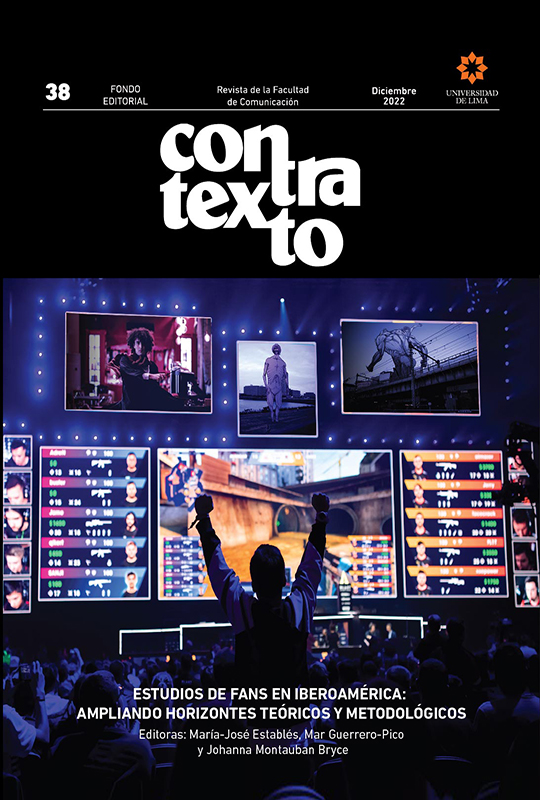Ampliando voces en los estudios de fans: diálogos desde Iberoamérica
DOI:
https://doi.org/10.26439/contratexto2022.n038.6095Descargas
Referencias
Barker, M. (2017). Speaking of ‘paratexts’: A theoretical revisitation. The Journal of Fandom Studies, 5(3), 235-249.
Busse, K., & Hellekson, K. (2006). Introduction. En K. Hellekson y K. Busse (Eds.), Fan fiction y fan communities in the age of the internet (pp. 5-42). McFarland.
Chin, B., & Morimoto, L. (2013). Towards a theory of transcultural fandom. Participations, 10(1), 92-108.
Fiske, J. (1992). The cultural economy of fandom. En L. A. Lewis (Ed.), The adoring audience. Fan culture and popular media (pp. 30-49). Routledge.
Gómez-García, S., Chicharro-Merayo, M., Vicent-Ibáñez, M., & Durántez-Stolle, P. (2022). La política a la que jugamos. Cultura, videojuegos y ludoficción política en la plataforma Steam. index.comunicación, 12(2), 277-303. https://doi.org/10.33732/ixc/12/02Lapoli
Hills, M. (2002). Fan cultures. Routledge.
Hofmann, M. A. (2018). Johnlock meta and authorial intent in Sherlock fandom: Affirmational or transformational? Transformative Works and Cultures, 28, 1-8. https://doi.org/10.3983/twc.2018.1465
Jenkins, H. (1992). Textual poachers. Television fans and participatory culture. Routledge.
Jenkins, H. (2009a). The revenge of the origami unicorn: Seven principles of transmedia storytelling (Well, two actually. Five more on Friday). Confessions of an Aca-Fan: The Official Weblog of Henry Jenkins. http://henryjenkins.org/blog/2009/12/the_revenge_of_the_origami_uni.html
Jenkins, H. (2009b). The revenge of the origami unicorn: The remaining four principles of transmedia storytelling. Confessions of an Aca-Fan: The Official Weblog of Henry Jenkins. http://henryjenkins.org/blog/2009/12/revenge_of_the_origami_unicorn.html
Jenkins, H., Shresthova, S., Gamber-Thompson, L., Kligler-Vilenchik, N., & Zimmerman, A. (2016). By any media necessary: The new youth activism. New York University Press.
Jensen, J. (1992). Fandom as a pathology: The consequences of characterization. En L. A. Lewis (Ed.), The adoring audience. Fan culture and popular media (pp. 9-29). Routledge.
Kohnen, M. (2014). ‘The power of geek’: Fandom as gendered commodity at Comic-Con. Creative Industries Journal, 7(1), 75-78. https://doi.org/10.1080/17510694.2014.8.92295
Ming-Tak, M., & Wang, Y. (2021). How propagames work as a part of digital authoritarism: An analysis of a popular Chinese propagame. Media, Culture & Society, 43(8), 1431-1448. https://doi.org/10.1177/01634437211029846
Moreno, A. (2021). Tecnonacionalismo, guerra digital y videojuegos en China. Ediciones de la Universidad Complutense de Madrid.
Moreno, A. (2022). Tecnonacionalismo. El videojuego como objeto de estudio en las Ciencias Sociales. Tiempo Devorado. Revista de Historia Actual, 1, 33-58. https://revistes.uab.cat/tdevorado/article/view/v7-n1-moreno/163-pdf-es
Roig, A. (2017). Películas realizadas por fans: ¿una categoría incómoda? Palabra Clave,20(4), 979-1007. https://doi.org/10.5294/pacla.2017.20.4.6
Scolari, C. A. (2013.) Narrativas transmedia: cuando todos los medios cuentan. Deusto.
Scott, S. (2019). Fake geek girls. Fandom, gender and the convergence culture industry. New York University Press
Descargas
Publicado
Número
Sección
Licencia
Todos los trabajos publicados están sujetos a una licencia CC BY 4.0 Creative Commons (actualizado el 1 de marzo de 2021).
El contenido de la revista se puede compartir en cualquier material o formato. Asimismo, se puede adaptar, contribuir y transformar. Ambas posibilidades sólo están permitidas en la medida en que cumplan las siguientes condiciones:
- Atribución: Se debe otorgar crédito donde sea debido, proporcionar un enlace a la licencia e indicar los cambios en caso se realice alguno. Esto debe hacerse de la manera que se considere apropiada, sin sugerir que el licenciante lo promueva a usted o su uso del material.
Derechos de propiedad
Los derechos patrimoniales de Contratexto se publican bajo una licencia Creative Commons BY 4.0, lo que permite a los autores mantener los derechos patrimoniales de su obra sin restricciones.
Si un trabajo publicado en Contratexto fuera copiado, distribuido, difundido o cualquier otra actividad contemplada en la licencia antes mencionada, se deberá mencionar de manera visible y expresa al autor o autores y a la revista.
Auto-archivo
Esta revista permite y anima a los autores/as a publicar artículos enviados a la revista en sus sitios web personales o en depósitos institucionales, tanto antes como después de su publicación en esta revista, siempre y cuando proporcionen información bibliográfica que acredite, si procede, su publicación en ella.






















